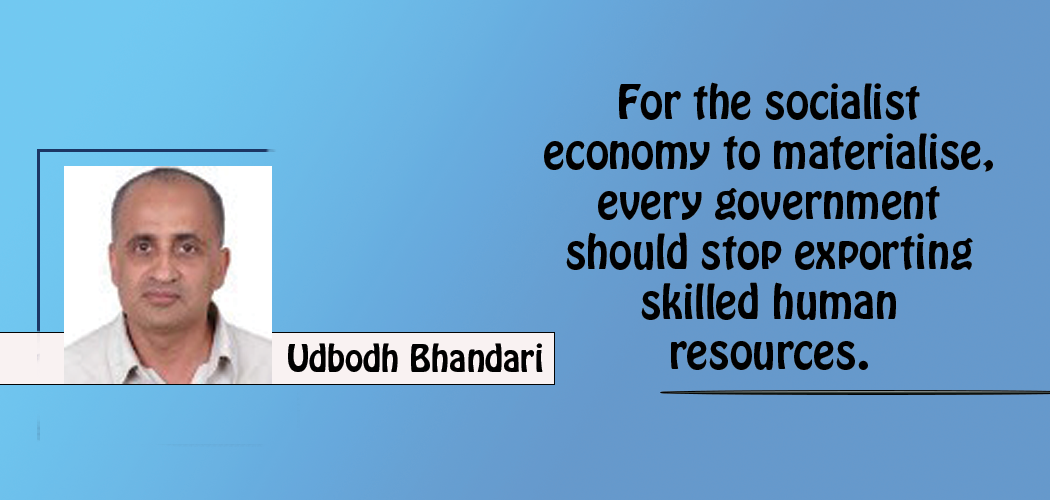- Sunday, 1 March 2026
Socialism Remains Merely A Mirage
Udbodh Bhandari
The Constitution of Nepal, 2015 mentions the term ‘socialism’ strongly three times. Preliminary in Part 1 states, “State of Nepal: Nepal is an independent…democratic, socialism-oriented, federal democratic republican state”.
Sub-article 3 of article 50 (Directive Principles) in Part 4 of the constitution states, “The economic objective of the State shall be to achieve… and to develop a socialist-oriented independent and prosperous economy while making the national economy independent, self-reliant and progressive in order to build an exploitation free society by abolishing economic inequality through equitable distribution of the gains.” Similarly, the Preamble maintains, “Being committed to socialism based on democratic norms and values including the people's competitive multiparty democratic system of governance, civil liberties…”
Bottom-up approach
In this way, Nepal's constitution envisions a wealthy and socialist country. The national charter has opened the stage for the country’s transition to socialism. Nevertheless, critical economic and public organisations have been delegated to the private sector. So, Nepal is yet to prepare the ground for a socialistic economy. Socialism and the welfare state are complementary to each other. On the brink of a local election slated for May 13, each political party and victorious candidates should design their plan toward the creation of a socialistic economy at the local level with strong application of the ‘bottom-up’ approach to the economy.
Socialism is a philosophy and political and economic theory with practice in different parts of the world and with a slogan of “from each according to his ability and to each according to his work”. Other distinguishing characteristics of socialism include the state's free provision of essential human needs such as education, health, and shelter.
Globally speaking, Scandinavian and Nordic countries have strong social security systems (as a key part of a socialistic economy), though they have not claimed their economy as a socialistic one. Sweden privatised a portion of its social security system in the 1990s as part of major pension reforms. Nepal, on the other hand, is still to develop strongly the social security system at first hand. It is just unthinkable to build socialism on a shattered social and economic foundation, as Nepal has done. For the socialist economy to materialise, every government should stop exporting skilled human resources. The fact is that the exodus of over half of the working-age population has reached other countries.
COVID-19 has sent out several messages to the rest of the globe. It has been dealt with more effectively in countries with centralised public services, public healthcare systems, planned economies, and stronger public policies than in capitalist countries with liberal economies. As a result, whether the crisis is economic or health-related, the capitalist countries have no choice but to imitate socialist models. It is difficult to improve the economy of a country like Nepal, which is characterised by a heavy reliance on foreign aid, remittances, a large trade imbalance, comprador capitalism, widespread corruption, and so on.
Consequently, building a socialist economy in such a situation is nearly impossible. In this sense, the government should have a role in ensuring people's fundamental rights to food sovereignty, as well as work, housing, and social security. More importantly, each political party should examine the current Nepali economy, in which a few elites control resources, finance, and technology while the majority suffers from poverty, hunger, unemployment, migration, and other issues. So, the government should begin limiting neoliberal influence not only to respect the people's mandate but also for the benefit of the vast majority of people.
This is an excellent opportunity to unveil a package of initiatives and awards to safeguard and encourage small-scale agriculture and industry. When it comes to eradicating hunger and poverty and ensuring social justice, there is no option to resurrect a highly depleted state-led economic activity that was rather strong 30 years ago. Another key change, in addition to the public sector, is to stress cooperatives and public sectors in order to develop a self-sufficient economy. Following the financial crisis of the previous decade and the current pandemic, even capitalist countries are moving toward a mixed economy with a focus on the role of the state.
Moreover, it is also crucial to draw lessons from the planned economy and state-owned firms, which account for 75 per cent of employment and safeguard the localised production and distribution system. Subsidising and promoting local food and goods will also help to curb massive imports. Small and rural firms can be far more direct, viable, and effective means of providing the finest outputs benefiting huge masses when it comes to a sovereign economy and socialist change of Nepali character. In the case of agriculture, neoliberalism is using industrialisation, modernisation, and commercialisation to trap small and marginal producers in a cycle of poverty and evict them from their production system.
Restructuring of economy
Now, to restructure the local economy and move toward self-reliance, it is critical to invest in agro-ecology-based peasant agriculture, promote microenterprises, state-run companies and factories, cooperatives, and communal production distribution channels, and prioritise smoke-free and localised industries. Here, other sources of the national economy, including remittance, tourism, and other service industries, were harmed as a result of COVID-19.
Agriculture can be strength, but it all depends on how the measures are taken by the planners. Any negligence or ignorance can destroy the peasants and agriculture, whereas a tiny effort can bring about a major transformation in terms of income, employment, and rural development. More crucially, without a grasp of the current international order, the socialist movement is impossible. Further, according to political experts and researchers, the country is unlikely to establish socialism due to existing socioeconomic realities and a variety of other variables.
(The author is a freelancer in research activities and local development.)
















